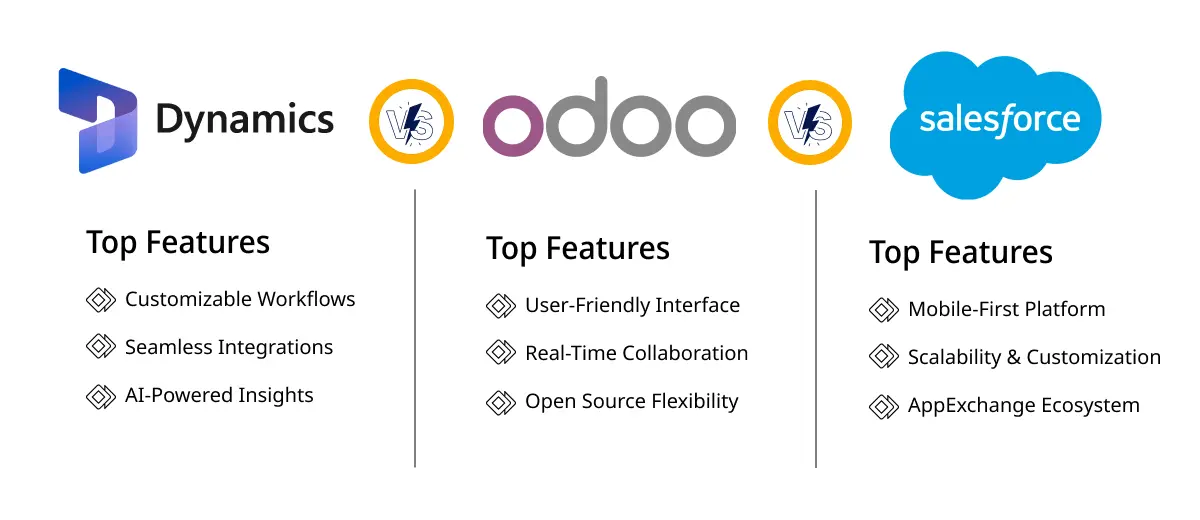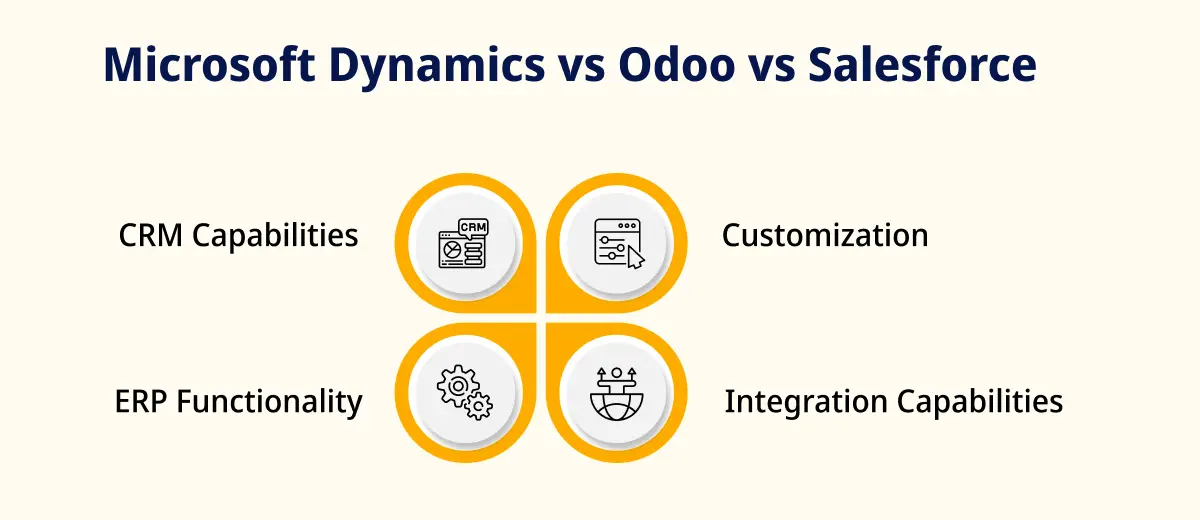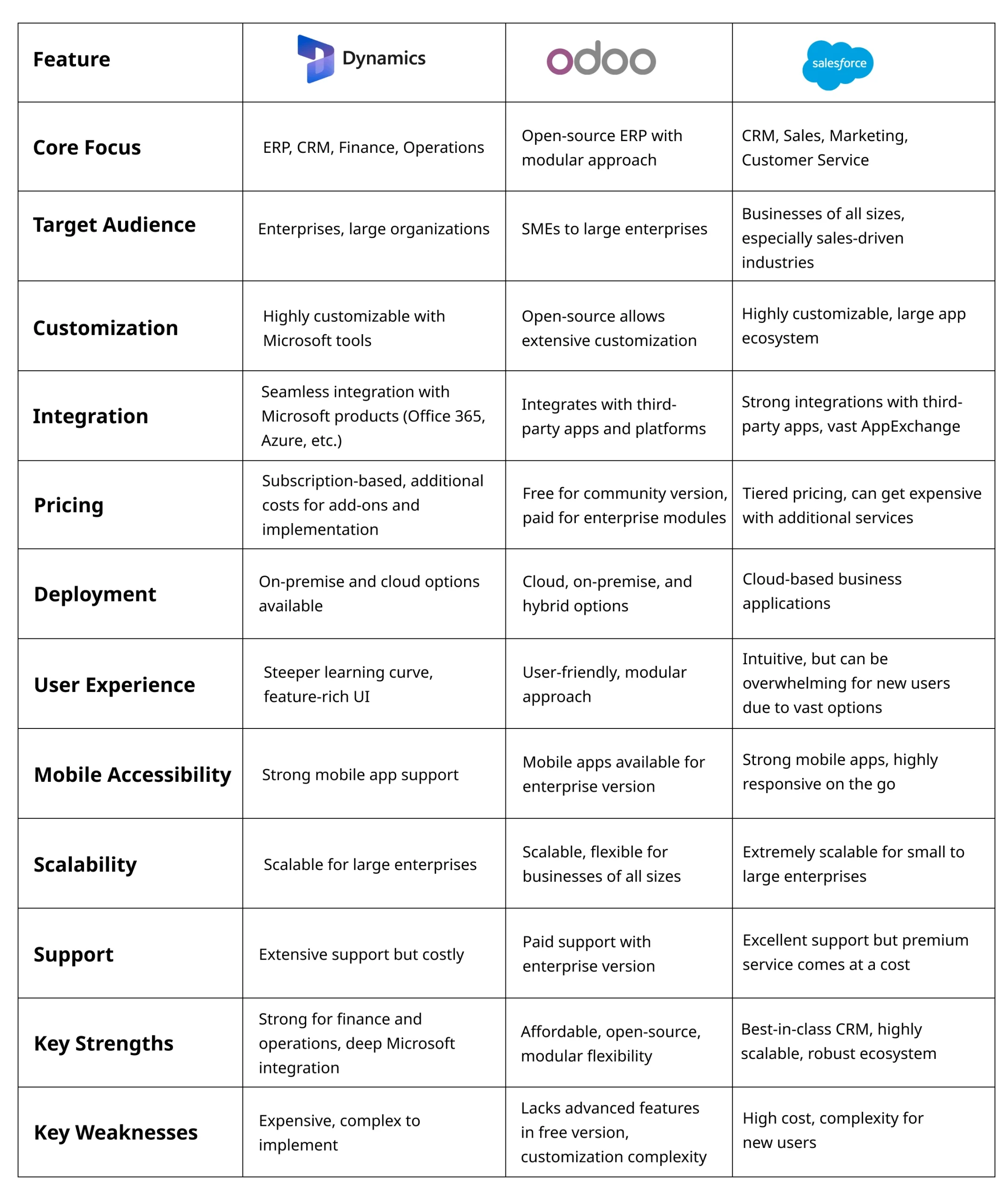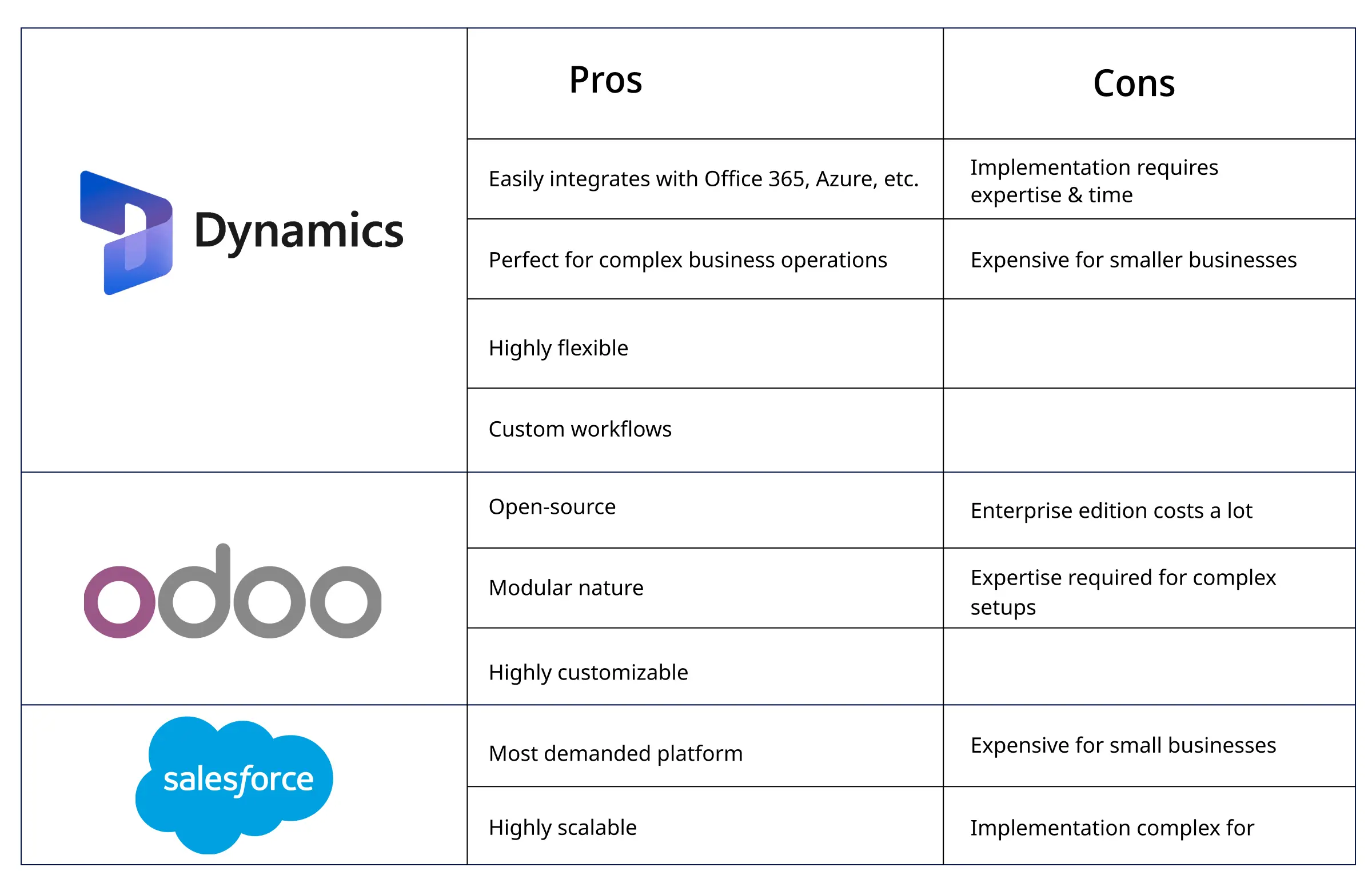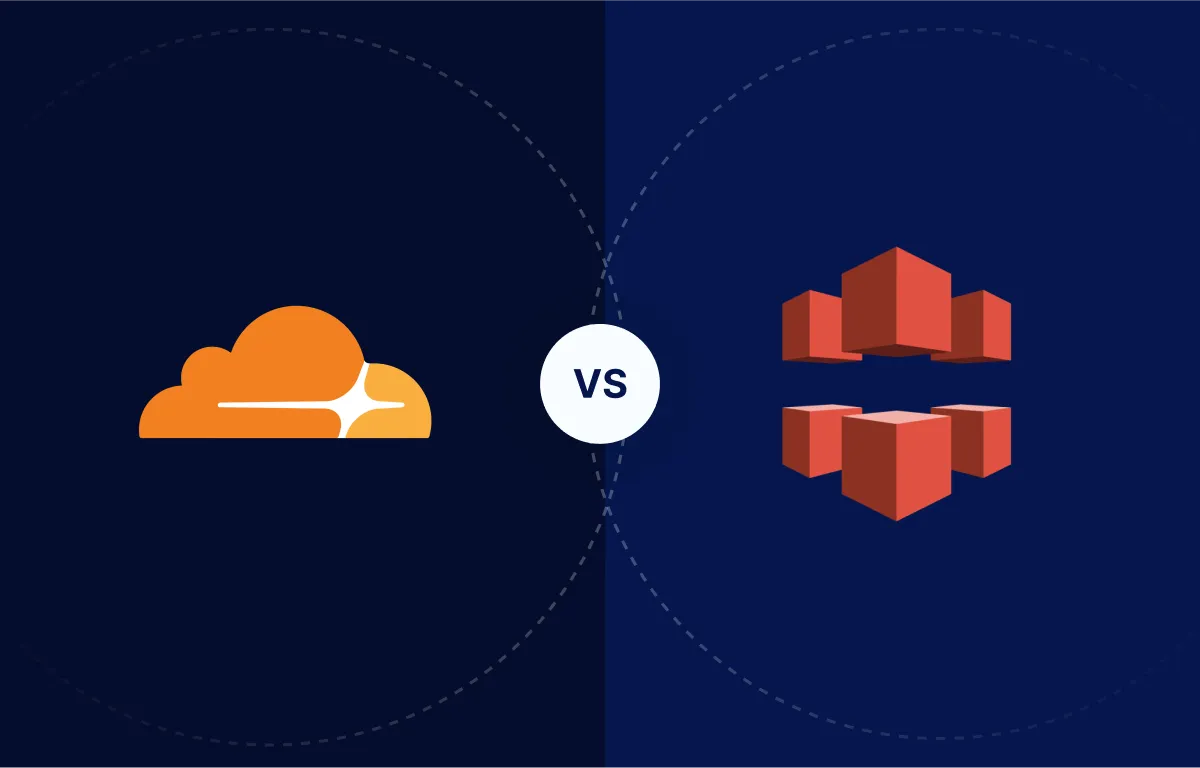Do you need help managing your growing business with outdated software?
A robust ERP or CRM platform is essential for streamlined operations and efficient growth for SMEs.
Microsoft Dynamics, Odoo, and Salesforce are three leading platforms that offer unique features tailored to different business needs. However, finding the best fit among these platforms can be challenging.
Choosing the wrong platform could lead to productivity losses, increased costs, and missed opportunities.
Our detailed comparison of Microsoft Dynamics, Odoo, and Salesforce platforms will help you identify the ideal solution for your unique requirements and make an informed decision.
An Overview of Each Platform
This overview sets a strong foundation for a detailed comparison of these platforms.
Microsoft Dynamics
Microsoft Dynamics is a fully-featured suite of ERP and CRM applications optimized to streamline business operations with the help of an overarching industry.
It targets high-end enterprises and midsized companies with comprehensive ERP solutions for financial management, CRM, sales, supply chain management, customer service, and marketing.
A key advantage is its deep integration with Microsoft technologies like Azure, Office 365, and Power BI, creating a cohesive digital workspace.
Odoo
Odoo is an all-in-one, open-source ERP solution. Ideal for small and medium-sized businesses, it helps create cost-effective business management software solutions with high customization. Its key modules include sales, accounting, inventory, manufacturing, and HR.
Odoo’s modular nature allows companies to pick the features that they need, making it more flexible and scalable.
Salesforce
Salesforce is the world’s leading cloud-based CRM platform that focuses on customer relationship management. The AI integration in Salesforce makes it more valuable in this competitive era.
A Salesforce development company can help businesses fully leverage its capabilities, including managing customer data, optimizing sales pipelines, running marketing campaigns, and providing seamless customer service. S
Salesforce is scalable and suitable for businesses of all sizes, from startups to large enterprises.
Get expert guidance from our experts to compare Microsoft Dynamics, Odoo, and Salesforce.
Features Comparison: Microsoft Dynamics vs Odoo vs Salesforce
We have compared all three platforms in the “Microsoft Dynamics vs Odoo vs Salesforce” discussion using various features/parameters. Let’s checkout:
CRM Capabilities
Microsoft Dynamics supports effortless integration with Microsoft products. It is a very efficient system for lead management and customer engagement in enterprise resource planning.
Odoo offers essential CRM functions with an emphasis on personalization and cost-effectiveness.
Salesforce is at the forefront of CRM as it provides real-time dashboards. These dashboards further provide actionable insights into sales performance for data-driven decision-making.
ERP Functionality
Microsoft Dynamics excels in ERP functionality by offering finance, supply chain, and manufacturing modules.
Odoo is robust in ERP and excels in inventory, supply chain, and accounting. Key features include real-time stock tracking, advanced reporting, and forecasting.
Salesforce does not focus on ERP, primarily catering to CRM.
Customization
Odoo, being open-source, allows high-level customization to meet unique business requirements. This includes tailored billing cycles, automated notifications, dashboard customization etc.
Microsoft Dynamics offers strong flexibility within the Microsoft ecosystem but requires expert customization.
Salesforce also offers customization through AppExchange, but with more predefined structures.
We help you choose the most cost-effective platform without compromising functionality.
Integration Capabilities
Microsoft Dynamics easily integrates with the entire Microsoft suite and provides embedded customer insights, unified document management, calendar integration, and more.
Salesforce boasts a vast marketplace, AppExchange, for easy third-party integrations.
Odoo provides API capabilities for integration with a wide range of third-party apps but requires more development expertise.
Let’s compare the three platforms using a table. This will help businesses weigh the features and choose the one that best suits their needs.
User Experience & Interface
You can make informed decisions about which platform might best suit their needs based on user experience and accessibility.
User Interface Comparison
Microsoft Dynamics offers a familiar, Microsoft-inspired interface, which may be attractive to users of other Microsoft products. However, the product does have so many features that it can sometimes be confusing.
Odoo has a clean and intuitive interface designed for ease of use by small and medium businesses. It may appeal to those looking for simple functionality without lots of options.
Salesforce offers a user-friendly interface along with customizable dashboards and workflows. It is intended for people with a mix of technical skill levels; its feature set, however, might be too wide to accommodate everyone.
Learning Curve
Microsoft Dynamics has a steeper learning curve due to its wide array of enterprise-level functionalities. Users may need extensive training to maximize their potential.
Odoo is more accessible to navigate for new users, particularly for smaller businesses with simple requirements. The open-source nature allows for easy adjustments without too much learning overhead.
Salesforce is very easy to get started with. However, mastering all its aspects is not straightforward, especially for large businesses that use more advanced features such as automation and analytics.
Mobile App Availability & User Experience
Microsoft Dynamics comes with rich mobile apps that seamlessly integrate with the on-premises software development experience, making it suitable for remote work and mobility.
Odoo’s mobile application offers core functions, but it may lag in scope compared to its desktop variation, yet it’s developed with every update.
Salesforce is a leader in mobile accessibility. Its mobile apps are very intuitive and feature-rich, ideal for sales teams and field agents who need real-time access to CRM data.
Cloud & On-Premise Options
Microsoft Dynamics offers both on-premise and cloud-based software solutions. Businesses can choose based on their infrastructure needs and security concerns.
Primarily cloud-based but also on-premise, Odoo gives flexibility to companies that want control over their data.
Salesforce provides entirely cloud-based business applications. This ensures users can access their data anytime, anywhere, without having physical servers or infrastructure, making it highly scalable.
Also Read: Top 16 Salesforce Consulting Companies in the USA in 2025
Pricing Structure
This breakdown of the pricing structure helps businesses understand the cost implications of choosing Microsoft Dynamics, Odoo, or Salesforce based on their specific needs and budget.
Microsoft Dynamics
Microsoft Dynamics primarily works on a subscription-based model, offering flexible monthly and annual plans.
The price depends on the type of products (for example, Microsoft Dynamics 365 for Sales, Finance, or Operations) and the number of users. Licensing can be either per user or per app.
The cost of add-ons and implementation involves adding extra modules and customizations, which can be very costly.
Implementation can be expensive, especially for big companies, as it often involves external consulting, customization, and integration with other Microsoft products like Azure or Office 365.
Odoo
Odoo offers a free, open-source community edition, which provides basic functionality. The enterprise version, on the other hand, is subscription-based and includes advanced features, support, and hosting options.
Odoo’s pricing is modular, so businesses pay only for the modules they use. This involves:
- CRM
- Inventory
- Accounting
This makes Odoo highly accessible for small to medium-sized businesses, though the cost increases as the number of modules increases.
The costs associated with implementing the solution and the level of customization will also contribute to the total expense.
Salesforce
Salesforce operates with a tiered pricing structure and several editions which involves:
- Essentials
- Professional
- Enterprise
- Unlimited
The cost difference reflects varying functionality and scalability at every level. Costs become quite high at the enterprise level.
While Salesforce’s core CRM functionality is available at various price points, additional costs are incurred for other modules such as CRM marketing automation (Pardot), service cloud, and analytics.
These add-ons can substantially increase the total cost for businesses looking for a full suite of features.
Our experts help you compare Microsoft Dynamics, Odoo, and Salesforce to maximize your business efficiency.
Scalability & Suitability for Businesses
Microsoft Dynamics vs Odoo vs Salesforce comparison provides which platform is the most scalable and suits your business model.
Small & Medium-Sized Enterprises
It is cost-effective, open source, and has minimal deployment processes, which makes Odoo apt for SMEs. This reduces the financial burden on a small company and provides its crucial features.
Salesforce and Microsoft Dynamics offer more advanced features but may be more expensive for SMEs, although their modular structures allow gradual scaling.
Large Enterprises
Microsoft Dynamics is well-suited for large enterprises with complex, global operations, providing robust scalability, multi-entity management, and deep ERP functionalities.
Salesforce excels in scalability with global CRM management, offering extensive customization and integrations. Odoo can be scaled but may require additional customization for enterprise-level needs.
Support & Community
The following discussion of each platform’s support and community can help you make the right decision when choosing between Microsoft Dynamics vs Odoo vs Salesforce.
Microsoft Dynamics
Microsoft Dynamics migration offers a vast partner ecosystem with dedicated support channels, extensive documentation, and training resources.
The platform also has a strong user community that shares insights and troubleshooting tips.
Odoo
Odoo provides two support models: open-source community support and paid professional support.
While the open-source model fosters community collaboration, the paid version offers direct support with quicker resolutions.
Salesforce
Salesforce boasts robust customer support, including the Trailblazer Community.
It also offers extensive training programs and certifications to help users optimize the platform’s capabilities.
Also Read: Top 10 Odoo Development Companies in 2024
Pros and Cons of Each Platform from Business Perspective
The following key strengths and weaknesses of each platform help businesses make an informed decision when choosing between Microsoft Dynamics vs Odoo vs Salesforce:
Microsoft Dynamics
It comes with the following strengths and limitations:
Strengths:
- It integrates perfectly with Office 365, Azure, and all the other Microsoft products.
- Microsoft Dynamics has functionalities from ERP and CRM to finance and operations, making it a perfect tool for complex business needs.
- It is highly flexible, which makes its adoption easy among various types of businesses.
- Custom workflows can be designed using Microsoft Dynamics CRM services.
Limitations:
- Its setup and implementation may take considerable time and require external expertise, particularly in large organizations.
- Add-ons, customizations, and additional modules may raise the cost, making it very expensive for smaller businesses.
Odoo
It comes with the following strengths and limitations:
Advantages:
- The open-source community version of Odoo is free, and the enterprise version is affordable, especially for small and medium-sized businesses.
- Odoo’s modular nature allows businesses to begin with a small setup and then add more modules according to business needs, thus making it scalable.
- It is highly customizable, especially in the open-source version, so businesses can mold the platform using Odoo development services.
Drawbacks:
- The free version has fewer advanced features and support, so businesses might want to purchase the enterprise edition.
- Customization is allowed but requires technical knowledge, especially for big deployments or more complex setups.
Salesforce
It comes with the following strengths and limitations:
Benefits:
- Salesforce is considered among the best CRM platforms. It is highly empowered for sales, customer service, and marketing automation.
- Growing with the business, the scalability of Salesforce Sharepoint integration ranges from small businesses to large corporations.
- Through the marketplace of third-party apps and integrations, there are vast customization options and Salesforce add-ons.
Challenges:
- Salesforce’s pricing is too expensive for small businesses or startups, particularly at the enterprise level.
- Although powerful, the platform might be overwhelming for new users, and implementing Salesforce often involves external consultants or developers.
We help you select reliable software with insights on integration and scalability.
Final Words
Choosing the right platform among “Microsoft Dynamics vs Odoo vs Salesforce” would depend on your business’s specific needs, budget, and scalability goals.
Microsoft Dynamics is ideal for those seeking seamless integration, while Odoo offers unmatched customization flexibility, particularly for SMEs. On the other hand, Salesforce excels in cloud-based CRM, delivering advanced automation and analytics.
Each platform has unique strengths, and the final decision should align these features with your business objectives for long-term success.
You may also contact ValueCoders (one of the top Microsoft Dynamics CRM companies) having expertise in these technologies and ready to serve you anytime. We have completed 4200+ projects successfully and are serving global clients.


